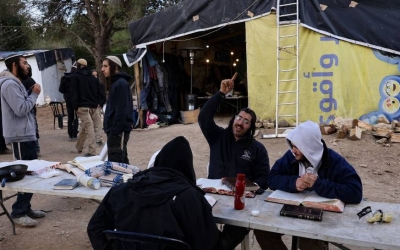Israel: Bennett says coalition could collapse 'in a week or two' after MP quits

Israel's fragile governing coalition appeared closer to collapse on Monday after reports that a lawmaker from Prime Minister Naftali Bennett's right-wing Yamina Party said he was "no longer part" of the government.
The development came as Bennett's ideologically diverse coalition, which includes hard right and Arab parties, has staggered ever closer to implosion, a year after it ended Benjamin Netanyahu's record 12-year rule.
"I have informed the prime minister that based on the current situation, I am no longer part of the coalition," Nir Orbach said in a statement published by several Israeli media outlets.
No comment was immediately available to Reuters from Orbach, whose statement said "extremist and anti-Zionist" members of parliament had taken the coalition "in problematic directions".
His statement said he wanted to avoid another election and he would not vote to dissolve parliament, although his departure left Bennett's coalition two short of a majority, with 59 seats in the 120-member Knesset (parliament).
New MEE newsletter: Jerusalem Dispatch
Sign up to get the latest insights and analysis on Israel-Palestine, alongside Turkey Unpacked and other MEE newsletters
In leaving the coalition, Orbach becomes the third Yamina MP to desert Bennett, who is now has just four party members in the coalition.
Following the MP's announcement, Bennett admitted in the Knesset that the government may collapse within “a week or two” unless MPs who have quit the coalition return.
“If they don’t, then we cannot [continue],” he said.
Orbach's resignation came despite reports on Monday that officials in Bennett's government had pledged that illegal settlers in Homesh, in the occupied West Bank, would not be evacuated in the coming months in a bid to prevent a potential collapse of the coalition.
The promise comes despite a Supreme Court decision which ruled in favour of evacuating the settlers from the outpost near the city of Nablus.
The move came after Orbach had held a series of talks with Bennett and Interior Minister Ayelet Shaked, in which he had told them the coalition has no chance of surviving in the long term.
'One of the longest funerals in history'
Netanyahu, now leader of the opposition and vowing a comeback despite being on trial for alleged corruption, said the government was holding "one of the longest funerals in history".
Following weeks of bickering between the partners, the clearest sign of the coalition's weakness came last week when a bill extending Israeli civil law rights to settlers in the occupied West Bank was defeated in parliament.
The defeat has brought closer the prospect of a fifth election in three years, although the bill is likely to be returned to the Knesset for a second attempt before the end of the month.
The settlers law, which would normally enjoy broad support in parliament and has been repeatedly renewed over the past five decades, fell victim to the increasingly bitter climate between the government and opposition.
"You are not fighting for our country but for your own seat," Netanyahu told Bennett, once one of his closest aides, during a debate in parliament.
Bennett, a former commando and tech millionaire who launched into national politics in 2013, said his government had boosted economic growth, cut unemployment and eliminated the deficit for the first time in 14 years.
"We are fighting for the government these days," he told the Knesset. "We are fighting because the choice is between chaos and stability."
Middle East Eye delivers independent and unrivalled coverage and analysis of the Middle East, North Africa and beyond. To learn more about republishing this content and the associated fees, please fill out this form. More about MEE can be found here.






